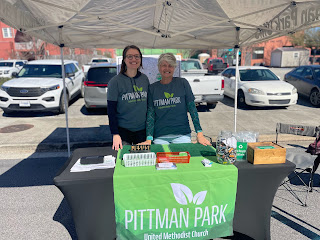By: Ainslie Smith
In March 2018, China banned the import of most paper and plastic recyclables under a policy called Operation National Sword. Because of this, the recycling industry in the United States has changed significantly in the past 5 years and has required consumers and producers to look for new solutions to the complex issues presented by waste products. Different organizations in Statesboro have taken recycling and sustainability into their own hands and showcased these efforts at the ninth annual GreenFest.
What began as a personal project with the recyclable waste created in one home, has turned into a curbside collection service available to the residents of Statesboro and the surrounding areas.
In a recent interview, Jon Cook, the owner, and operator of GreenRock Recycling company described his business model and the process of creating a new product out of recycled material.
“This process that I use, it turns [recyclable materials] into either a landscaping rock, or a piece of road, or a piece of construction material that has a life span of decades and even at the end of the life of the product… it can actually be put back into the process and recycled again so its life is then extended for several more decades,” said Cook.
The first step of the GreenRock process is collecting the post-consumer recyclables, then sorting for hazardous materials, shredding/crushing the plastic and glass, heating and combining the materials in a machine developed by Cook, which then forms the materials into a raw polymer-based aggregate. This polymer-based aggregate can then go through different finishing processes and is used to create the landscaping products.
Unlike traditional recycling which requires the sorting and sterilization of different kinds of plastic, the GreenRock process can utilize all plastics, including synthetic fibers, that other recycling processes cannot. Currently, GreenRock diverts over 50 tons of recyclable materials every year that would otherwise end up in landfills.
The subscription service costs $28 a month and is currently being utilized by around 300 households and businesses. One subscriber of this service is Pittman Park UMC.
Similarly to Cook, Megan Hopkins, the Children's Director of Pittman Park UMC, and her husband noticed a gap in the accessibility of recycling services in the Statesboro area for a common, but environmentally harmful product; batteries.
In efforts to move toward a sustainable solution to this problem, they placed battery collection bins in front of the Pittman Park UMC office under the breezeway so anybody can drive through and drop off their used household batteries. Once collected, these batteries are taken to Interstate All Battery Center in Brunswick.
Hopkins says that people should recycle their used batteries because they contain toxins that can harm the environment, even in landfills. Most household batteries contain materials such as lead-acid, cadmium, and lithium-ion, which can contaminate groundwater and damage ecosystems, according to the Battery Recyclers of America.
Both GreenRock Recycling and Pittman Park UMC were participants in the ninth annual GreenFest celebrated in downtown Statesboro.
Keep Statesboro-Bulloch Beautiful (KSBB) and the City of Statesboro hosted the festival on Saturday, February 18, where local vendors, businesses, and other sustainable organizations gathered on East Vine Street to showcase the eco-friendly projects and efforts in the Statesboro community.
Georgia Southern’s ‘Sustain Southern’ program is one of GreenFest’s partners, and they demonstrated the university's positive environmental efforts with a natural dye workshop at this year's festival.
Kira Jatoft, the assistant director of sustainability and leadership, described how the workshop aimed to highlight the accessibility of making sustainable lifestyle choices and encouraged students to get involved in the program.
The Sustain Southern Program participates and hosts multiple events throughout the year to bring sustainability to the attention of students and community members, including the annual Sustain Southern Week that will be hosted on the Statesboro campus from April 3 - April 7. This event will include a farmers market, information about the university's recycling program, education about sustainable practices, as well as a climate action scavenger hunt.
For more information about sustainability efforts in the Statesboro community visit the KSBB website, where you can find events and programs that aim to involve community members in environmental projects.






